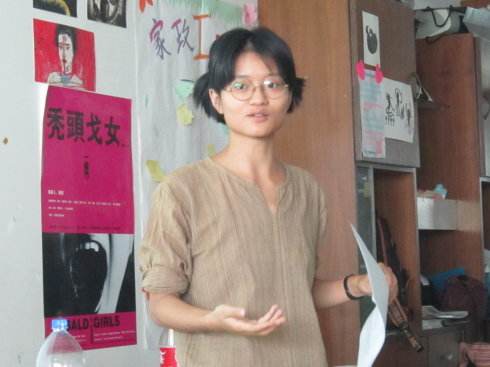China must combat on-campus sexual harassment: an open letter

Xiao Meili 肖美丽 (real name Xiao Yue 肖月, pictured) is one of China’s best-known women’s rights activists, having made international headlines in 2015 for organizing an “armpit hair contest” to redefine “feminine beauty,” and before that, from 2013 to 2014, for walking 1,400 miles to raise awareness of sexual abuse on college campuses, and before that, in 2012, when she protested domestic violence by wearing a bloody wedding gown.
On Monday, Xiao — inspired by a former Beihang University student coming forward with her story of experiencing sexual harassment — penned an open letter to her alma mater, the Communication University of China (CUC) in Beijing, detailing a plan to prevent sexual harassment on college campuses. Sixteen other people signed the letter, with many more publicly offering support after its publication. [UPDATE, 1/9, 8 a.m.: The letter has been deleted from WeChat and Weibo. “It’s been deleted several times already,” Xiao says.]
Below is a full translation.
An open letter from former students of the Communication University of China to propose a system to prevent on-campus sexual harassment
Dear Principal Hu Zhengrong 胡正荣, and the faculty and students of the school,
We are a group of Communication University of China alumni who have for years closely followed gender equality as a social problem. Recently, news of Luo Qianqian 罗茜茜, a former student at Beihang University, reporting her Ph.D. adviser, Chen Xiaowu 陈小武, of long-term sexual harassment has ignited lots of discussion in society, and was applauded by many as the start of a #MeToo movement in China. Within a few days, students and alumni from more than 20 institutions — including Xi’an International Studies University, Beihang University, Nanhua University, Beijing Normal University, Nanjing Normal University, Zhongshan University, Beijing University of Posts and Telecommunications, Xi’an Peihua College, Shandong University, Hubei University, Zhejiang University, Changan University, Southwest University, Central China Normal University, Northeast Normal University, Northwest University, Shantou University, Dalian International Studies University, Northwest Agriculture and Forestry University, Shaanxi Normal University, Tianjin University of Commerce, Chuzhou University, Shanghai Jiaotong University, Peking University, and Wuhan University — wrote letters to their schools.
It’s painful to hear that Luo and many other women were harassed, coerced, and forced to stay silent about their experiences. Chen’s misconduct really is not an anomaly. Sexual harassment is in fact rampant on Chinese college campuses, and victims, under coercion from their instructors, usually have nowhere to file their allegations. Even if they are brave enough to speak up, justice is not served in many cases. During our studies at CUC, we all more or less witnessed or heard of similar cases. For example, in 2010, Professor Song Nannan 宋南男 reportedly forced his female students to sleep with him, but in the end, the matter wasn’t addressed. Statistics from NGOCN show that among 13 cases of misconduct from university instructors over the last four years, a third of them remain unresolved. According to a survey published by the Guangzhou Gender Education Center in April 2017, more than 75 percent of current and former female college students in China are victims of sexual harassment.
At the same time, the liberal and open environment at CUC nurtured many Chinese feminists. In September 2005, UNESCO introduced a course on media and gender to the school. The CUC Media and Gender Institute created a benchmark for Chinese studies on gender equality. CUC is known for its consideration of students, and is dubbed by us as “Haidilao University.” [Haidilao is a popular hot pot chain in China famous for its warm service.] For instance, back in 2011, CUC turned some of the men’s restrooms on campus into women’s restrooms due to the fact that female students outnumbered their male counterparts. This was a practical step toward realizing gender equality.
Given the severity of sexual harassment at institutions, we feel obliged to be vocal. It’s imperative that Chinese colleges construct a mechanism to prevent sexual harassment on campus. Luo’s courage also inspired us to call for change. Based on our trust in CUC, we, as alumni, hope the school can take the lead among Chinese universities to build mechanisms to prevent sexual harassment, raise sexual harassment prevention awareness among all faculty and students, and improve the current system of investigating harassment, resolving cases, maintaining confidentiality, etc. We also hope the school can provide a safe and just environment for all its faculty and students, positioning itself as a role model for all universities, in the CUC style.
On account of the above, we propose five suggestions, as follows:
- Offer a lecture about sexual harassment to every faculty and staff member of the school.
- Provide an anti-sexual-harassment lesson to every student at CUC.
- Conduct an online survey about sexual harassment every semester, allowing students to anonymously report cases of sexual harassment or experiences of anxiety or depression.
- Assign a specific department as well as a point person to handle allegations of sexual harassment.
- Establish a channel where allegations of sexual harassment can be reported. It can be a mailbox, an email address, a phone number, etc.
We know that even with these checks in place, we would still be far from eliminating on-campus sexual harassment. But as an old Chinese saying goes, “A thousand-mile journey begins with the first step.” Only by taking action can we anticipate change. We hope that CUC will adopt our suggestions above.
Yours sincerely,
Class of 2008, graduate of art design major in the advertising school, Xiao Yue 肖月
Class of 2008, graduate of art design major in the advertising school, Shui Jianni 税简妮
Class of 2010, graduate from the department of applied linguistics, Cui Le 崔乐
Class of 2008, graduate of production and management major in the media management school, Lin Jing 林菁
Class of 2012, graduate of radio and broadcasting major in the school of television, Chen Tianqi 陈天琪
Class of 2008, graduate of production and management major in the media management school, Li Dimin 李荻敏
Class of 2012, graduate of art design major in the advertising school, Chen Qiyu 陈麒玉
Class of 2008, graduate of art design major in the advertising school, Chen Chenxi 陈晨曦
Class of 2008, graduate of art design major in the advertising school, Kang Qing 康清
Class of 2010, graduate from the department of applied linguistics, Xue Yaqing 薛亚青
Class of 2007, graduate from the school of education, Wu You 吴优
Class of 2006, graduate of broadcasting major from the school of education, Zhao Cheng 赵成
Class of 2008, graduate of production and management major in the media management school, Yang Meng 杨蒙
Class of 2008, graduate of production and management major in the media management school, Sun Yawen 孙亚文
Class of 2008, graduate of production and management major in the media management school, Chen Huan 陈欢
Class of 2008, graduate from the school of animation, Chen Mengqian 陈梦牵
Class of 2008, graduate of international trade major in the media management school, Wang Yajing 王雅婧
—Translation by Jiayun Feng





